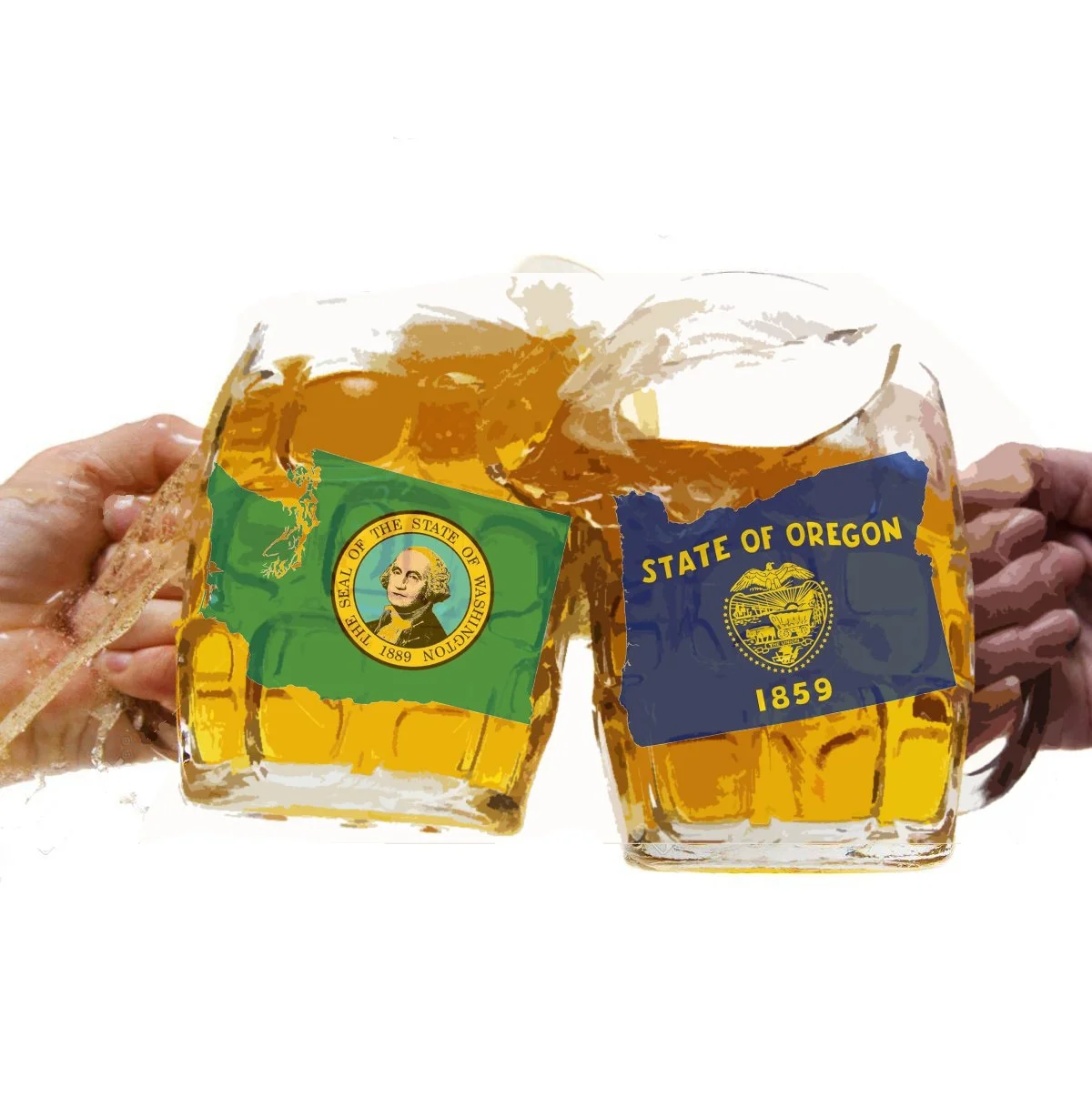Washington Breweries Win! Oregon settles Lawsuit for right to Self-Distribute and Ship
Washington Breweries Win! Oregon settles Lawsuit for right to Self-Distribute and Ship
OLCC will allow against out-of-state breweries to self-distribute beer to Oregon retailers and sell directly to Oregon consumers.
Last summer Washington breweries sued the state of Oregon naming Oregon Liquor & Cannabis Commissioners and the Governor in a lawsuit alleging discrimination that barred them from self-distributing or shipping direct in the state. The lawsuit was projected to take years to make it’s way through the courts, but has come to an unexpectedly quick conclusion this week as the OLCC has agreed to a settlement.
Washington plaintiffs Garden Path Fermentation (Burlington, WA), Fortside Brewing (Vancouver, WA), and Mirage Beer (Seattle, WA) alleged that Oregon’s statutory and regulatory frameworks relating to directly shipping beer to consumers and distributing beer to retail establishments violate the Commerce Clause of the United States Constitution by discriminating against interstate commerce and shielding local businesses from competition.
The goal of the lawsuit was to stop the defendants from enforcing statutes and regulations that they believe to be unconstitutional. Attorneys for the defendants Oregon Governor Tina Kotek, Oregon Attorney General Ellen Rosenblum, and Chairperson of the Oregon Liquor and Cannabis Commission (OLCC) Paul Rosenbaum filed a motion to dismiss arguing that Plaintiffs’ claims are barred by the Eleventh Amendment and that they lack the standing to request the prospective equitable relief. Plaintiffs then filed their First Amended Complaint adding the six other OLCC Commissioners. After various back and forth legal maneuvers, the court was ultimately unpersuaded by Defendants’ argument, which places form over substance and allowed the suit to move forward.
Recently, the OLCC commisioner and various staff members were forced out of the agency in a scandal that involved redirecting rare spirits away from the public and to key members of the organization. Perhaps fearing more bad press and damage to their reputation, the OLCC made a surprise offer to settle Washington breweries lawsuit rather than continue to fight it out in the courts over the next year.
Under the terms of the settlement, the OLCC has agreed to permit out-of-state beer producers the ability to self-distribute beer they manufacture to Oregon retailers. Additionally, the OLCC has agreed to not enforce the Oregon law that limits direct-to-consumer shipping privileges to permittees that hold an alcohol license in states that make similar privileges to OLCC licensees.
The settlement will expire in five years or earlier if the Oregon legislature enacts a law that provides for substantially similar privileges. Currently, lawmakers in Salem are considering such a law in the form of HB 2013, which is currently making its way through the House’s Ways and Means Committee.
Although, pursuant to the settlement’s terms, the State of Oregon has not admitted any liability in connection with the Plaintiff’s claims, the Plaintiffs see this settlement as a victory.
“This is a big win for Oregon consumers,” says Portland lawyer Judith A. Parker of the J.A. Parker Law Firm LLC, who served as local counsel for the Plaintiffs. “This settlement and the prospects of HB 2013 becoming law will bring Oregon policies in line with the United States Constitution’s provisions that prevent states from engaging in economic discrimination against out-of-state businesses.”
The basis for the lawsuit stems from the Commerce Clause, which grants Congress the authority to regulate interstate commerce. This authority has developed into a legal doctrine, sometimes referred to as the “Dormant Commerce Clause,” which includes a nondiscrimination principle that individual states are prohibited from enforcing laws that discriminate against, or unduly burden, interstate commerce. Even though the 21st Amendment of the Constitution, which repealed Prohibition, allowed states wide latitude to regulate alcohol sales, the U.S. Supreme Court’s ruling in Granholm v. Heald (2005) established the principle that states could not favor their own alcohol industries.
In addition to Ms. Parker, the Plaintiffs were represented by attorneys Robert Epstein and James Tanford of Epstein Seif Porter & Beutel, who notably litigated the Granholm case before the Supreme Court, along with their associate, Alexander Avtgis,
Prior to this settlement, Oregon statutes (ORS §§ 471.200 and 471.221) permitted in-state breweries to self-distribute to licensed retail businesses, while prohibiting out-of-state breweries from enjoying the same right. Additionally, Oregon law (ORS § 471.282 and OAR 845-006-392) allowed in-state breweries to ship their beer directly to Oregon consumers, but expressly prohibited Washington breweries from the same privilege.
With this settlement, the beer landscape of Portland, often regarded as one of the most competitive beer markets in the country, is poised to change.
“This settlement is a critical step in a growing movement to increase social and economic equity in the beer industry, not simply by broadening consumer access beer, but likewise increasing the ability for out-of-state breweries to more easily access new markets,” says Justin Leigh, co-owner of Dwinell Country Ales (Goldendale, WA) and licensed attorney who helped to organize the lawsuit and served as an expert witness for the Plaintiffs.
The “Complaint” was captioned as Garden Path Fermentation v. Brown under Case No. 3:22-cv-01086. Individuals may read the Complaint by visiting the U.S. District Court’s website: ord.uscourts.gov.



